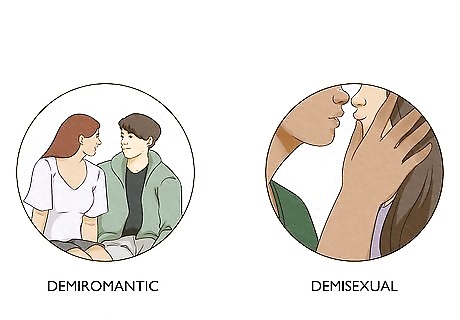
views
- Someone who identifies as demiromantic often only feels romantic attraction toward a person once they’ve formed a deep emotional connection with them.
- Someone who’s demiromantic usually doesn’t feel romantic attraction for people they don’t know and may not experience having crushes that often or at all.
- Demiromantics often need a deep connection before they experience romantic attraction, whereas demisexuals need that kind of connection before experiencing sexual attraction.
What does it mean to be demiromantic?

A demiromantic only feels romantic attraction when there’s an emotional connection. Demiromanticism falls along the aromantic spectrum, a group of romantic identities characterized by a lack of or limited experience of romantic attraction. In the case of a demiromantic, they usually don’t experience romantic attraction toward others until they’ve formed a close emotional bond with a person. For example, someone who identifies as demiromantic might only experience romantic attraction toward a person they’ve been friends with for a long time. Demiromanticism falls under the category of grayromanticism. The term grayromantic describes a person who experiences romantic attraction in an infrequent way. Another example of a grayromantic would be someone who identifies as frayromantic, meaning they only feel romantic attraction for people they don’t know or aren’t close to. Demiromantics also differ from aromantics who usually don’t experience any romantic attraction.
Signs You Might Be Demiromantic

You don’t feel romantic attraction for people you don’t know. To you, the whole idea of “love at first sight” may not make a lot of sense. It might seem odd to you that your friends or other people around you say that they want to date someone they barely know right away. Instead, you may feel more comfortable with the idea of dating someone you already consider to be a close friend and someone you can trust. The term romantic attraction usually refers to a person’s desire to be romantically involved with someone, such as by dating. It’s often characterized by infatuation with another person and a strong desire to be in a romantic relationship with them.

You’ve never had a crush on a stranger. Typically, having a crush on someone means that you feel romantic attraction toward them and may be interested in being romantically involved with them. However, you might not experience this if you identify as demiromantic, and you might not ever really experience “love at first sight.” You might not completely relate to others when they talk about the butterflies and jittery feelings they get around their crushes because you personally haven’t experienced that. However, it’s more than possible that you might later experience having a crush on someone you feel close to, such as a friend you’ve known for a long time.

You feel sexual attraction, but not romantic attraction. If you identify as demiromantic, you may still experience sexual attraction toward others, and you might not mind being sexually involved with someone you’re not as familiar with. However, the idea of being in a romantic relationship might still remain unappealing until you get to know the person better and form a deeper connection. For example, you might prefer a “friends with benefits” arrangement if you feel sexual attraction toward someone. This usually allows people to keep romantic feelings out of the mix and just focus on sexual attraction.

You don’t have a long history of romantic relationships. Many people who identify as demiromantic typically prefer to only become romantically involved with people they’ve known for a long time and consider to be their close friends. If this is true for you, then you might notice that your dating history isn’t too extensive since it can take a while to reach that point of emotional closeness. Remember that there’s absolutely nothing wrong with having fewer romantic partners (or none at all) compared to other people. The amount of relationships you’ve had doesn’t define your ability to form connections with and love other people.

Your relationships tend to move slowly. To many people who identify as demiromantic, a feeling of closeness and trust is something they need in order to feel romantic attraction for someone. If you also identify as demiromantic, you might prioritize getting to know someone on a deeper level before even considering being involved romantically. For example, you might only eventually feel romantic attraction for a friend whom you feel comfortable opening up to and confiding in. Or, you might only feel comfortable with the idea of a romantic relationship after you’ve known someone for a couple of years as opposed to just a few weeks or months.
Demiromantic vs. Demisexual

Demiromanticism refers to romantic attraction while demisexuality refers to sexual attraction. Whereas people who identify as demiromantic usually only feel romantic attraction toward people they feel emotionally close to, people who identify as demisexual may only experience sexual attraction once they’ve formed a close bond. Sexual attraction refers to a person’s desire to be sexually involved with someone. Someone who’s demisexual may also only feel sexual attraction for someone once they’ve formed a strong romantic bond. People who identify as demisexual may still experience romantic attraction for others even if they don’t have that close of a relationship yet. The differentiation between sexual and romantic attraction comes from the Split Attraction Model (SAM) which claims that people can feel romantic and sexual attraction separate from one another.
Being in a Relationship as a Demiromantic

Romantic relationships look different for every demiromantic. While a traditional romantic relationship may be the end goal for some who identify as demiromantic, that certainly isn’t (and doesn’t have to be) the case for everyone. The important thing is that you find a dynamic that works for you and leaves you feeling comfortable and secure in your relationship. It’s important to be honest with other people about your views on and feelings toward relationships. If you feel comfortable with it, coming out to others can open up lines of communication and offer the other person more clarity on the situation and what they can do to make you feel comfortable. The Trevor Project’s “Coming Out Handbook” provides a lot of great information on how to start that conversation in a way that’s comfortable for you. Rather than a romantic relationship, some demiromantic people might instead opt to be in a queerplatonic relationship (QPR). These are close relationships that aren’t strictly platonic or romantic. Each relationship is different depending on the people involved, with options to include or exclude things like romantic gestures or sexual intimacy.

Boundaries are important in creating a satisfying relationship. Always be honest with your preferences and set firm boundaries regarding what you want and don’t want from a relationship. If there are aspects of your relationship with someone that make you uncomfortable, make those things clear and say no to anything that you’re not okay with. For example: If you’re not comfortable with romantic gestures, mention that to your partner. Discuss your expectations in terms of sexual intimacy. Is that something you’re comfortable with? Are you hoping to be exclusive with your partner, or are you both okay with something more like an open relationship? Whether you’re aiming for a more traditional-looking relationship or something like a QPR, discussing expectations and boundaries is essential to making sure you and the other person are on the same page.

Friendships are just as important as romantic relationships. If you identify as demiromantic, don’t feel pressured to enter a romantic relationship right away. Many demiromantics view emotional closeness and trust as something necessary before they start to feel romantic attraction, and this is usually achieved through building friendships. Don’t pressure yourself to fall in love with anyone and just focus on the great friendships you have and really getting to know the people already in your life. Spend quality time with friends so that you get more opportunities to bond and get to know each other. Don’t be afraid to open up to trusted friends about things like how you’re feeling, your aspirations for the future, and your worries. Allowing yourself to be vulnerable (and listening when your friends do the same) can help forge a strong connection. There’s a misconception that people who identify as demiromantic are distrusting or even cold-hearted, but that’s certainly not the case. There’s nothing wrong with taking a bit more time to get to know someone before thinking about entering a relationship.
Being an Ally to Demiromantics

Inform yourself about the demiromantic identity and what it means. Reading this article is a great first step in the right direction. To better understand what someone who identifies as demiromantic may be going through, do some research on demiromanticism and the aromantic spectrum as a whole. Read this printable guide from the Aromantic-spectrum Union for Recognition, Education, and Advocacy (AUREA) to learn more about what steps you can take to be an ally to someone who identifies somewhere on the aromantic spectrum. AUREA’s website aromanticism.org also provides a glossary of terms related to aromanticism, including demiromanticism, and other resources to check out.

Be open to listening to the other person’s experiences. Demiromanticism means something different for every single person. No two people’s experiences will be the exact same, so take care to really listen to their individual stories and show empathy for their situation. If you have questions, don’t be afraid to ask (while remaining respectful, of course). The other person may just really appreciate being heard and having their feelings recognized. To get a better sense of what people who identify as demiromantic may be going through, one idea is to consult online forums. For example, the Asexual Visibility and Education Network (AVEN) has a forum where people who identify on the asexual and/or aromantic and allies alike can come together to talk.

Keep yourself in check if you make a mistake. You’re certainly allowed to make mistakes—after all, you’re only human. The important part is that you recognize your mistakes and address them directly rather than playing them off. Apologize for your mistake and correct yourself. Also, be open to feedback from the other person and ask what you can do better in the future. For example, if someone calls you out for saying something that they interpreted as being offensive, rather than getting defensive, stop and say, “I’m sorry if my words hurt you. What I should have said was…” Part of being an ally is also not being afraid to call out others on any insensitive behaviors. If someone makes a rude comment or perpetuates a stereotype about demisexuals or people who identify along the aromantic spectrum, call out what they said and gently correct them.

















Comments
0 comment